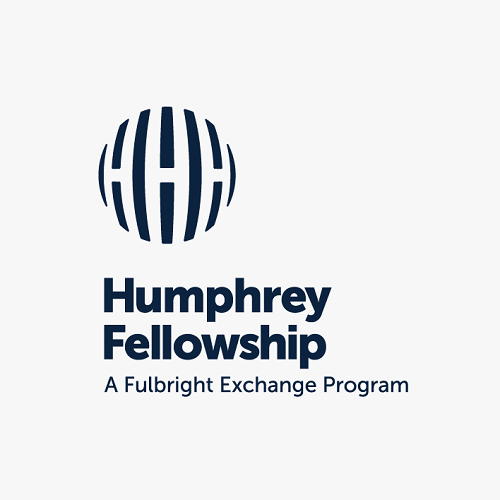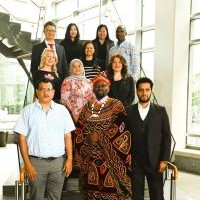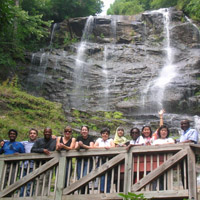Hubert H. Humphrey Fellowship Program
2024-2025 Humphrey Fellows
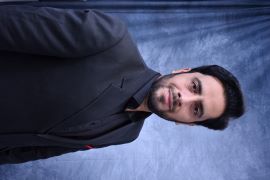 I hail from Balochistan, a tribal province and one of the less developed areas of Pakistan due to various political, socio-economic, and socio-cultural reasons. As a social services worker, I have witnessed numerous issues, illnesses, and deaths, which have not only scarred me for life but have also motivated me to dedicate the rest of my life to improving the lives of my people.
I hail from Balochistan, a tribal province and one of the less developed areas of Pakistan due to various political, socio-economic, and socio-cultural reasons. As a social services worker, I have witnessed numerous issues, illnesses, and deaths, which have not only scarred me for life but have also motivated me to dedicate the rest of my life to improving the lives of my people.
To reach my goal of making a significant impact on the welfare of my people, I grounded myself with the appropriate education. I earned a bachelor’s degree in sociology and political science, followed by a master’s degree in social work. Subsequently, I completed my MPhil in the social work program from the University of Balochistan. My thesis, "The Socio Economic Factors causing Hepatitis B and C in the Jaffarabad District of Balochistan, Pakistan," was published in the HEC-recognized Balochistan Review Journal in 2018.
To supplement my academic journey and simultaneously develop my career, I started practicing social work in various fields. I worked on the Social Services Project at Sandeman Provincial Civil Hospital and the Rahnuma Family Planning Association of Pakistan (RAHNUMA FPAP) in the Quetta region, focusing on Sexual Reproductive Health & Rights in 2014. Before this, I worked as an MIS Officer in Greenstar Social Marketing (TB project) and interned at other social service organizations.
Outside of my professional activities, I have always been passionate about sports, physical fitness, and hiking. I was an active member of the University of Balochistan’s cricket team. I also make it a point to regularly visit the gym to maintain my physical well-being. Additionally, I enjoy exploring Balochistan’s natural beauty and rich history. I have hiked at Chiltan Mountains (Koh e Chiltan), Sleeping Beauty Trek, Mahardar Quetta, and visited hidden waterfalls.
To contribute to the betterment of my province, I joined the Balochistan AIDS Control Program, where I have been serving as a Case Manager since 2018. This position has allowed me to work with people living with HIV/AIDS, providing services and support to help them overcome psycho-social challenges. Furthermore, I have been developing linkages with community leaders, CBOs/NGOs, and public/private healthcare facilities.
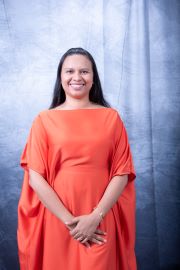
I am from La Guajira, Colombia, where more than 45% of the population is indigenous, primarily the Wayuu people. These communities lack basic necessities like clean water and access to health and education services. Witnessing these needs in my adolescence motivated me to work for them. Upon entering the National University of Colombia, I committed to returning to my land to serve my people.
After graduating in December 2009, I started working at the hospital in my hometown. Eight months later, I moved to Riohacha to work with a foundation running food security programs in indigenous communities. I spent six days a week in the rural area, assessing nutritional status, conducting healthy eating workshops, and supporting native food planting programs. After three years, I felt the need for further professional development and returned to Bogotá for a specialization in food and nutrition in health promotion.
Equipped with more tools, I returned to La Guajira and joined another foundation focused on reducing maternal morbidity and infant mortality in indigenous communities. For the past nine years, I have been dedicated to serving the children, mothers, and families of La Guajira, building knowledge that protects and promotes health.
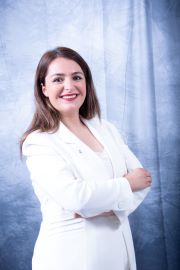
For the past 12 years, I have served as an occupational health and safety expert at the Ministry of Labour and Social Security, where I was helpful in the implementation of Türkiye's inaugural OHS Law. My role at the Ministry included law promotion activities, authorization, and supervision of OHS institutions.
I received a master's degree in chemical engineering and concentrated my thesis on the occupational health and safety impacts of hazardous waste disposal facilities. Additionally, I composed an expertise thesis on the OHS practices and hazardous waste disposal facilities at the MoLSS, with an emphasis on public health outcomes in addition to safety measurements.
The objective of my work is to enhance societal awareness and OHS culture. I have been involved in a variety of projects and committees, such as the Anti-Drug Committee, which was organized by the prime minister's office. During my time on this committee, I devised preventive measures for workplaces and contributed to rehabilitation projects targeting drug users.
I also collaborated with the Ministry of Environment, Urbanisation and Climate Change on a project to establish a certification program for technical staff at wastewater treatment plants. This program encompassed site visits, risk assessments, and training programs to guarantee the safety of workers and the public. Additionally, I was involved in the organisation of national and international OHS congresses, the development of sub-regulations under the OHS law, and drafting of strategic plans for the MoLSS.
I conducted extensive research and proposed the establishment of a COVID-19 Scientific Committee during the COVID-19 pandemic in my capacity as advisor to the director general. We developed training materials, posters, and videos to encourage the appropriate use of personal protective equipment (PPE) and preventive measures in the workplace. I assisted in the coordination of relief campaigns and ensured the safety of rescue personnel by supplying the requisite PPE following the recent earthquake in Türkiye.
I am committed to contributing to the education of underprivileged children, the support of children battling cancer, the coverage of surgery costs for sick children, and the work of organisations that advocate for the environment. Volunteering is a significant aspect of my existence. I am also a council member of the Career Professionals Association, where I advocate for improved working conditions and professional development.
One of my long-term objectives is to enhance Türkiye's occupational health and safety system by analysing data on occupational diseases and accidents. I intend to contribute to legislative research by investigating the health consequences of asbestos and dioxins resulting from waste disposal. Additionally, I am interested in conducting research to mitigate the negative impacts of dust, asbestos, and dioxins on public health, as well as to mitigate future health issues and expenditures, given that Türkiye is an earthquake-prone nation and urban transformation processes have only recently commenced.
Last but not least, my most important and ultimate goal, as demonstrated by both my professional experiences and my personal efforts, is to promote a comprehensive perspective on the literature by increasing society's awareness of public health and the environment.
 Jerome Nyhalah Dinga, PhD, earned his BSc in microbiology, followed by an MSc in biomedicine, from the University of Linköping, Sweden. He then completed a PhD in biochemistry at the University of Buea, Cameroon, in 2015.
Jerome Nyhalah Dinga, PhD, earned his BSc in microbiology, followed by an MSc in biomedicine, from the University of Linköping, Sweden. He then completed a PhD in biochemistry at the University of Buea, Cameroon, in 2015.
During his PhD, he cloned and expressed a chimeric gene construct from Plasmodium falciparum, the malaria pathogen. The UB05-09 chimera protein was shown to be a marker of immune protection in malaria. His postdoctoral research showed that the chimeric protein provided sterile protection against murine malaria in mice. This work is now being taking further in a bit to contribute to the development of a safe, efficacious, and effective malaria vaccine with widespread application.
In 2018, he founded the Michael Gahnyam Gbeugvat Foundation (MGGFoundation) in honor of his late father. MGGFoundation, based in Buea, Cameroon, is a not-for-profit, non-racial, non-denominational, apolitical, non-governmental organization focusing on the health needs of persons living with disabilities and the less privileged. They conduct health outreach campaigns, cover medical bills for individuals with deformities, support blind students, and conduct public health research.
Simultaneously, Dinga is currently teaching molecular biology and biotechnology at the University of Buea, Cameroon, and the Pan African University of Basic Sciences Technology and Innovation, Nairobi, Kenya. He also supervises postgraduate students (Master of Public Health,
Master of Science, and PhD theses) in the fields of public health, biochemistry, molecular
biology, as well as biotechnology.
Dinga has won awards, grants, and fellowships that are advancing his career in public health
advocacy and biotechnology, as well as meeting the health aspirations of persons living with
disabilities. He has published widely in the fields of public health and biomedicine. He is,
therefore, a public health advocate, researcher, mentor, humanitarian, molecular biologist, and
biotechnologist who believes equitable global access to vaccines is achievable once vaccine
production and uptake in developing countries equates that of developed countries.
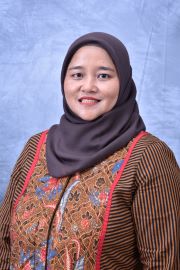 From Jakarta, Indonesia, my academic and professional journey has been driven by a commitment to safeguarding public health through rigorous enforcement of pharmaceutical and food safety regulations. I am a pharmacist and also hold a Master of Science in national resilience studies from the School of Strategic and Global Studies, Universitas Indonesia. My thesis, which investigated a stakeholder policy framework for combating substandard and falsified pharmaceutical products in Indonesia, laid the foundation for my future career in public health and safety.
From Jakarta, Indonesia, my academic and professional journey has been driven by a commitment to safeguarding public health through rigorous enforcement of pharmaceutical and food safety regulations. I am a pharmacist and also hold a Master of Science in national resilience studies from the School of Strategic and Global Studies, Universitas Indonesia. My thesis, which investigated a stakeholder policy framework for combating substandard and falsified pharmaceutical products in Indonesia, laid the foundation for my future career in public health and safety.
Starting my career at the Indonesia FDA (BPOM) in 2005, I worked in various capacities that ranged from a laboratory staff assessing pharmaceutical product safety to a GMP inspector enforcing compliance in manufacturing facilities. I was later assigned as an investigator for Health Law Enforcement where I deepened my expertise in navigating complex regulatory environments and spearheading initiatives to enforce health laws.
My current role as head of the Law Enforcement Division involves formulating, planning, and managing activities related to intelligence and cybercrime for the diversion of food and pharmaceutical products in the Greater Jakarta Area. I am responsible for ensuring the effective enforcement of diversion-related laws and regulations.
In my current role, I lead critical initiatives against the illegal distribution and oversee the enforcement of pharmaceutical and food product regulations. I coordinate with various stakeholders, learning from
each partnership to better protect public health through collaborative enforcement and regulatory compliance. I am also eager to expand my network in the field of public health policy, pharmaceutical surveillance, and innovative technology, enhancing my ability to influence and innovate within Indonesia's health care landscape.
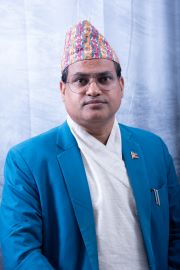
care, and the public health care system.
Joshi's academic journey began with an MBBS degree from Xinxiang Medical
University, China, followed by a specialization in General Practice & Emergency Medicine from B.P. Koirala Institute of Health Sciences, Nepal. His dedication and exceptional academic achievements have been widely recognized.
Professionally, Joshi has served in various esteemed roles, including senior/consultant medical generalist at Seti Provincial Hospital and Padma Hospital Pvt Limited. Currently, he is the province health director at the Province Health Directorate Office (PHDO), Sudurpaschim Province, where he oversees health programs for 88 local bodies.
His work focuses on monitoring of the health institutions and public health programs across the province including disaster preparedness, patient feedback, technology integration, maternal and child health, and human resource and infrastructure development. He has significant contributions to establishing the Provincial Ambulance Dispatch Center and well managing a Provincial Health Emergency Operation Center.
Joshi has significantly contributed to medical research, particularly on COVID-19, enhancing the understanding of the pandemic in Nepal and beyond. His research and academic contributions have earned him respect and recognition within the medical community.
Beyond his clinical and research duties, Joshi is actively involved in community initiatives, health camps, conferences, and various health seminars. He has taken leadership roles within the Nepalese Medical Association (NMA) Far West Branch and has participated in blood donation camps. His dedication to public health was honored with the Prawal Janasewa Shree (Fourth) Medal by the president of Nepal.
As the director of the Sudurpashchim Province Health Directorate, Joshi has led efforts in drafting provincial health policies, public health acts, and multi-hazard plans. His initiatives, such as the Rural Ultrasound Program, have improved pregnancy care and family planning. He has been proactive in addressing COVID-19, disaster management, and immunization gaps, aiming to reduce health inequalities and combat diseases.
Joshi envisions driving positive changes by leading the Ministry of Health and Population and contributing to achieving the sustainable development goals in Nepal. His professional goals include advancing health policy, programming, and planning; promoting the Rural Ultrasound Program; and researching capacity enhancement and health institution preparedness.
Through the Fulbright-Humphrey Fellowship program, Joshi aims to enhance his expertise, facilitating gap analysis and policy formulation. His endeavors will focus on improving health services in Nepal, blending academia and professional practice to promote evidence-based practices, research, and policy-making at all levels.
In conclusion, Joshi’s life and career embody the values of service, dedication, and excellence in public health and medicine. His significant contributions and commitment to community welfare have established him as a visionary leader in Nepal's healthcare landscape. His aspirations to lead the MoHP promise transformative improvements to the public healthcare system, advancing health equity in Nepal.
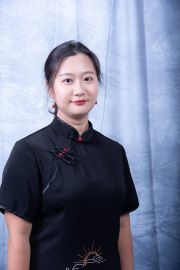
where our focus is on providing systematic solutions for rare disease issues in China. My undergraduate studies were in food quality and safety, and I am now pursuing an MBA at Peking University.
My journey in philanthropy began during my first year of undergraduate studies. Despite my academic focus, a profound interest in philanthropy led me to participate in support-teaching programs in impoverished regions of western China every summer throughout university. I also assumed a
leadership role in a student philanthropy society, designing projects to support impoverished areas and organizing youth philanthropy forums. These forums facilitated in-depth discussions and collaborations with active NGOs, encouraging more young people to engage in philanthropic activities.
This experience underscored the value of philanthropy in addressing societal issues and inspired me to pursue a career in the field after graduation.
In 2014, following graduation, I joined an NGO in Guangzhou focused on empowering grassroots
organizations across China and enhancing the leadership skills of organizational leaders. My responsibilities included supporting laborers, LGBTQ+ communities, individuals with disabilities, and
rare disease groups in their personal growth and empowerment efforts. It was during this period that I
began delving deeply into rare disease issues and volunteering for related causes. In 2017, I relocated to Beijing and started working for a social enterprise providing information technology support and
fundraising consultancy to Chinese philanthropic organizations. This role provided extensive insights into the development landscape of philanthropic organizations in China.
Since joining the Illness Challenge Foundation in 2019, I have been deeply involved in exploring rare disease issues in China. My advocacy efforts include promoting the establishment of a multi-party copayment system for civil medical assistance and fostering an innovative ecosystem for rare diseases. I am dedicated to connecting various stakeholders to advance rare disease public welfare and provide comprehensive solutions for patients. This involves establishing service systems for rare disease patients, advocating for government attention and policy improvements, and raising public awareness and social concern about rare diseases.
Recognizing the importance of gaining an international perspective on rare disease issues, I applied to
the HHH project based on a friend's recommendation. This year, I aim to learn best practices from the
United States and valuable insights from international fellows working on rare disease issues.
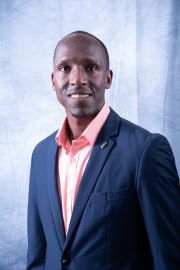
strengthen health systems in Sub-Saharan African countries. My research focuses on the interlinkages between public health, climate change, food security, non-communicable diseases, and sustainable development in low-income countries like Burundi.
From 2016 to 2018, I served as an operations officer at Village Health Action, where I conducted training on HIV, TB, and malaria prevention among injection drug users. I also led HIV and harm reduction rapid assessments among drug users; trained peer educators on HIV prevention, detection, and treatment; and engaged in community outreach on HIV, comorbidities, and substance abuse.
From 2018 to 2021, I worked as a coordinator at the Medical English Center, overseeing the budget for American Corner Spaces supported by the United States Embassy in Bujumbura, Burundi. During the COVID-19 pandemic, I initiated and managed the Alumni COVID-19 Response Project, providing personal protective equipment to over 2000 individuals across 20 primary schools and health centers. I organized four virtual conferences on tuberculosis, COVID-19, hepatitis, and HIV prevention and control through the U.S. Embassy's Facebook page. Additionally, I expanded medical English training to rural hospitals, training over 100 healthcare providers, and established English clubs in five universities and rural areas.
I am passionate about working in public health and improving healthcare quality through multifaceted interventions. I possess leadership, flexibility, creativity, and resilience skills necessary to achieve targets and support the implementation and management of research projects, including those focusing on public health, climate change, food security, health quality, environment, NCDs, gender equity, social determinants of health, and health system strengthening.
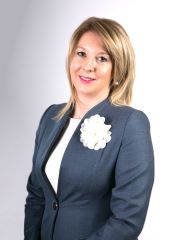 Sanja Sazdovska has been a state advisor at the Ministry of Health of North Macedonia for more than 15 years.
Sanja Sazdovska has been a state advisor at the Ministry of Health of North Macedonia for more than 15 years.
Her expertise as a public health professional was developed through postgraduate studies as well as a PhD focusing on prevention
programs for colorectal cancer, cervical cancer, and breast cancer. Among her major focus areas is the improvement of colorectal cancer screening programs, and she is also currently part of a team developing an electronic platform to facilitate the scheduling of regular PAP smear appointments.
She is a leader in her community when it comes to raising questions about women's rights and advocating for public health.
Sazdovska is currently a Hubert H. Humphrey Fellow at Emory University's
Rollins School of Public Health. During her fellowship, she intends to improve her knowledge of best practices in order to better instruct her students at Technological and Technical Faculty - Veles and address the public health issues that the Republic of North Macedonia is facing.

In 1995, I enrolled in Kryvyi Rih Medical College, Ukraine, where I trained as a nurse and gained invaluable experience in neonatal intensive care and working with people living with HIV. After a year of work, I enrolled in Dnipro State Medical University (DSMU), earning my medical degree in 2005 and
completing an internship in epidemiology in 2006. In 2007, I entered a full-time postgraduate PhD program in microbiology.
Since receiving my PhD in 2009, I have worked as a lecturer at DSMU and a medical microbiologist. From 2011 to 2014, I served as deputy dean of international students, combining practical, pedagogical, and administrative roles.
Since 2014, I have been head of the Department of Microbiology, Virology, Immunology, and Epidemiology at DSMU. I defended my doctoral thesis in 2018 and received a professor's diploma in 2020. Under my supervision, two PhD theses were defended in 2023.
I have participated in numerous professional development and training programs, including:
- ASM World Microbe Forum 2021, 2022, and 2023
- ESCMID Postgraduate Education Course in Croatia, 2022
- 32nd and 33rd European Congress of Clinical Microbiology & Infectious Diseases, 2022 and 2023
- Open Medical Institute (OMI) Seminar in Austria, 2023
- ESCMID Observership in the UK Public Health Agency, 2023
Until now, I have combined roles as an educator, department head, medical microbiologist, epidemiologist, volunteer, and social activist. My professional career spans public health, medical education, microbiology, and epidemiology.

I graduated with a MB, BS degree in 2010 from the University of Medicine (2), Yangon, Myanmar. Following graduation, I served as an assistant medical officer at Pinlon Private Hospital in Yangon for one year and four months. Subsequently, I spent a year as a private tutor for final year medical students before joining the Ministry of Health as a civil assistant surgeon in 2013. I volunteered to work at Falam General Hospital in Falam City, Chin State, Myanmar's remotest and poorest area, until January 2016.
At Falam General Hospital, admist challenging conditions with limited electricity and internet access limitation, I pursued professional development vigorously. Despite severe human resource constraints and extended 24-hour shifts due to staffing shortages, I managed both pediatric and medical wards simultaneously when pediatric and physician positions were vacant. In one notable instance, I coordinated care for 26 victims of a car accident alongside an orthopedic surgeon and nursing team.
In 2015, I was awarded the Australia Awards Scholarship, which allowed me to pursue a Master of Health Administration from Curtin University in Perth, Australia, graduating in December 2017. Returning to Myanmar, I transitioned from clinical to public health, working at the Subnational Tuberculosis and Leprosy Unit of Chin State Public Health Department in Hakha City. Starting as a team leader, I was promoted to Assistant Director in May 2020.
During my tenure, I led mobile active TB and leprosy case finding activities in over 100 hard-to-reach villages across Chin State, conducting CXR screenings and sputum examinations for more than 7,000 suspicious TB cases over two years. Planning mobile trips in Chin State's challenging mountainous terrain with poor infrastructure was particularly rewarding.
Admist the COVID-19 pandemic in 2020, I volunteered for three weeks in Yangon, Myanmar's COVID-19 epicenter, leveraging my hometown connections to contribute to the crisis. I left my job in 2021 and worked as a national UN volunteer in the northwest areas of Myanmar which have the highest internally displaced popualtions due to volatile political situations in Myanmar.
Meet the Emory Humphrey Fellows Program Team
Director:
Kenneth G. Castro, MD, FIDSA
Rollins School of Public Health,
Atlanta, GA 30322
Hubert Department of Global Health (HDGH)
Phone: (404) 727-5585
Email: kcastro@emory.edu
Rollins School of Public Health,
Atlanta, GA 30322
Hubert Department of Global Health (HDGH)
Phone: (404) 727-5585
Email: kcastro@emory.edu
Associate Director:
Christy Brozowski, MEd
Rollins School of Public Health,
Atlanta, GA 30322
Hubert Department of Global Health (HDGH)
Phone: (404) 726-0263
Email: christy.brozowski@emory.edu
Rollins School of Public Health,
Atlanta, GA 30322
Hubert Department of Global Health (HDGH)
Phone: (404) 726-0263
Email: christy.brozowski@emory.edu


